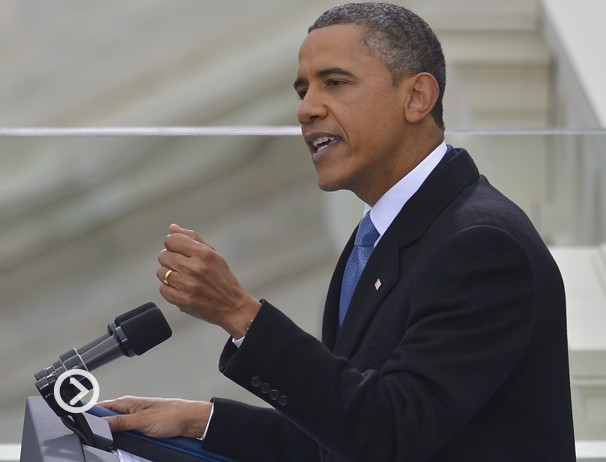A self-assured President Obama on Monday used his second inaugural address to lay out a bold liberal vision of the American future, drawing direct links between the origins of the republic and some of the most vexing political issues of the day.
The usual inauguration choreography of prayers and poems and crowds became a powerful demonstration of history’s arc: The first African American president was taking his second oath of office on a day named for the Rev. Martin Luther King Jr. on the Mall where King thundered almost 50 years ago about the United States’ unfulfilled promise.
 On a day when the president was at times confident and wistful, solemn and jubilant, he called on the American people to join him in creating a new nation grounded in the old ideas of equality and opportunity.
On a day when the president was at times confident and wistful, solemn and jubilant, he called on the American people to join him in creating a new nation grounded in the old ideas of equality and opportunity.
“What makes us exceptional, what makes us America, is our allegiance to an idea articulated in a declaration made more than two centuries ago,” Obama said. “We hold these truths to be self-evident, that all men are created equal.” He linked the struggle for civil rights and women’s suffrage to the debate over same-sex marriage, and promised to address immigration and climate change.
“We the people still believe that our obligations as Americans are not just to ourselves, but to all posterity,” he said.
Obama spoke to a throng bundled against the cold in scarves and hats. Attendees had come by plane, by car and crowded Metro to see his second inauguration.
Myrlie Evers-Williams, widow of slain civil rights activist Medgar Evers, spoke of “a great cloud of witnesses — unseen by the naked eye, but all around us — thankful that their living was not in vain.”
The 181 / 2-minute address showed a president who was seeking to shake off the personal caution and political gridlock that had hemmed in his ambitions before. His speech did not soar as much as it hurried: bouncing from goal to goal, building an agenda that could define his party — and his legacy.
“We cannot mistake absolutism for principle, or substitute spectacle for politics, or treat name-calling as reasoned debate. We must act, knowing that our work will be imperfect,” Obama said, in an address that quoted the Declaration of Independence, and repeated the opening words of the Constitution’s preamble: “We the people.”
“We must act, knowing that today’s victories will be only partial,” Obama said. “And that it will be up to those who stand here in four years — and 40 years, and 400 years hence — to advance the timeless spirit once conferred to us in a spare Philadelphia hall.”
Obama was the first president to use the word “gay” in his inaugural address. He had made outreach to gay voters and gay donors a key part of his reelection strategy. On Monday, he cast the battle for gay rights as part of a longer, broader struggle to make good on the declaration’s promise that “all of us are created equal.”
Obama listed three turning points: There was Seneca Falls, the town in New York where a convention in 1848 helped launch the women’s rights movement. There was Selma, referring to a civil rights march in Alabama in 1965.
President Obama takes second oath of office at inauguration
Washingtonpost
International News
10:01
Tuesday ,22 January 2013



